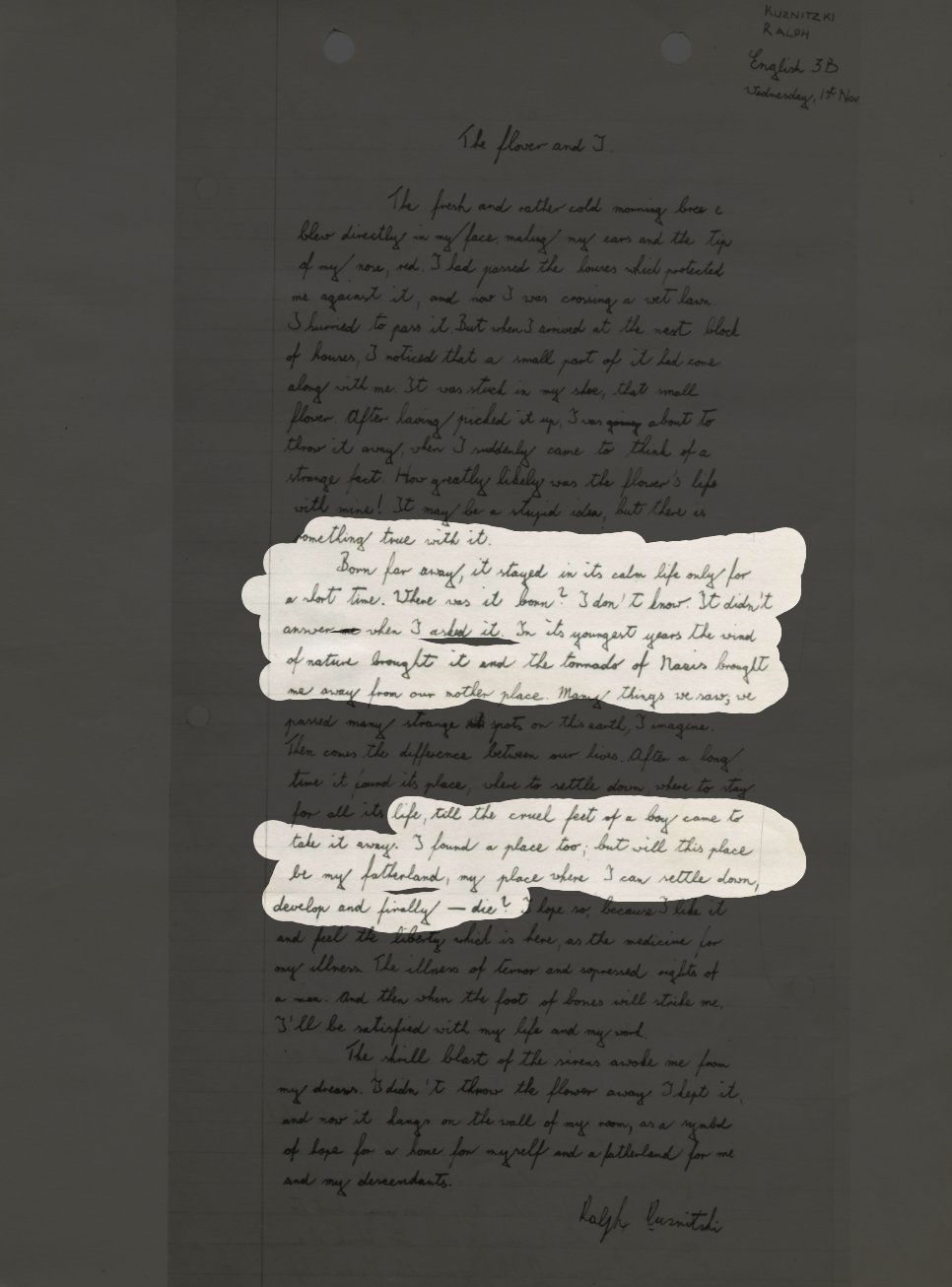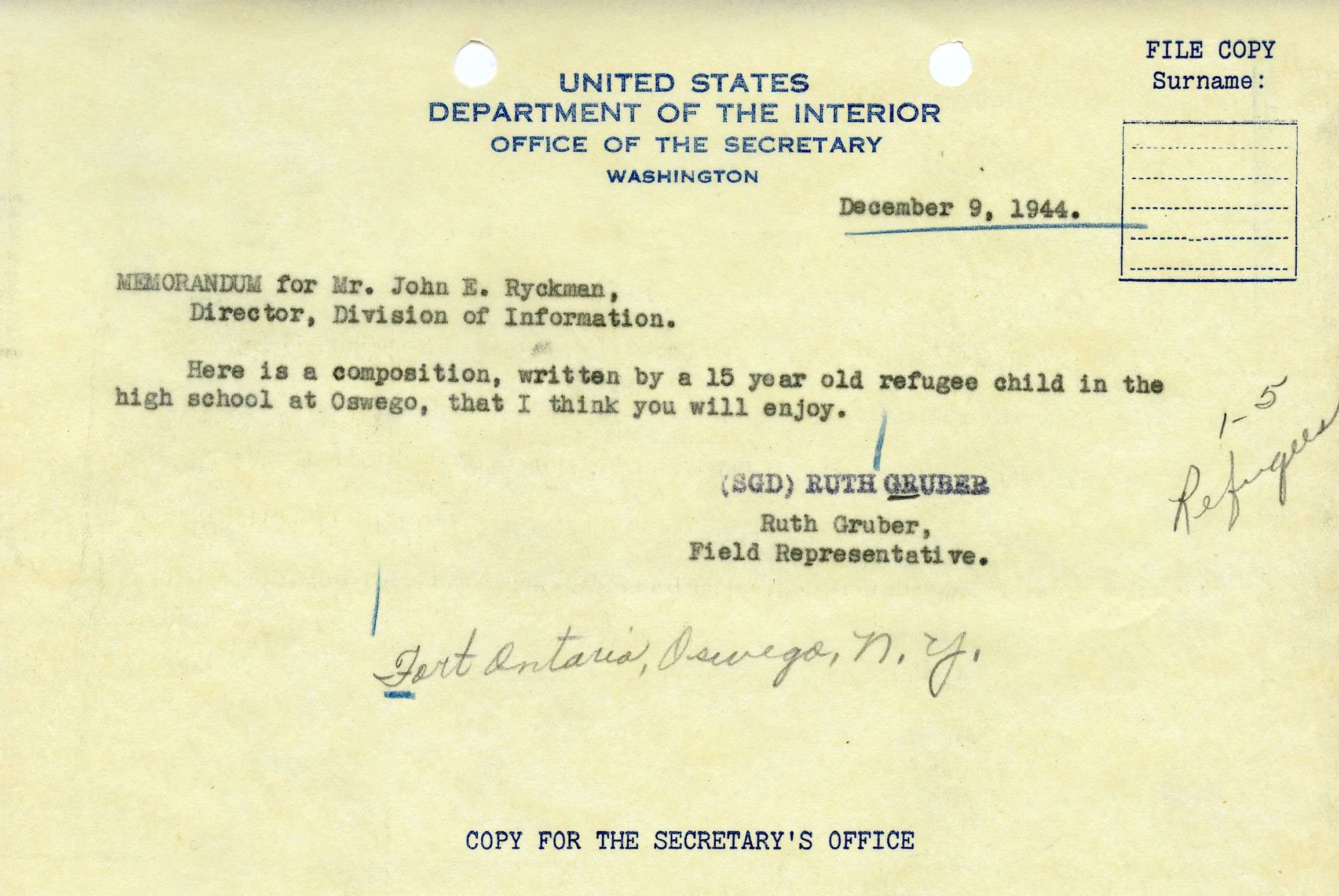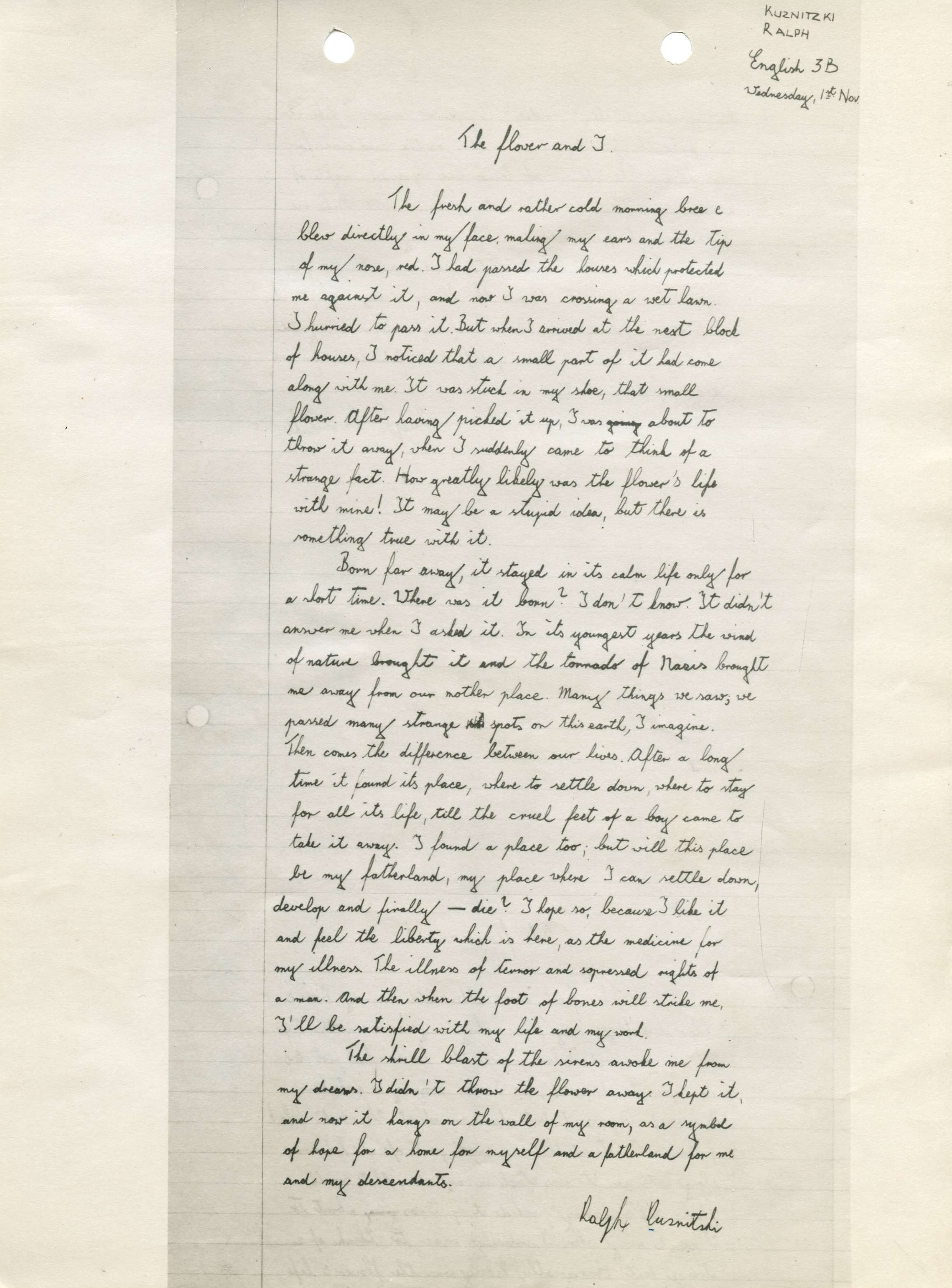A Teenage Refugee in America During World War II
Focusing on Details: Spotlight
All documents and text associated with this activity are printed below, followed by a worksheet for student responses.Introduction
Fifteen-year-old Ralph Kuznitzki wrote the following composition, “The Flower and I,” when he was living at the Ft. Ontario refugee camp near Oswego, NY. While most refugees had to stay mostly at the camp, children were able to attend local schools. Ralph attended high school in Oswego and wrote this for his English class.Look closely at the document, especially focusing on the highlighted sections, and then answer the questions beneath.
Name:
Class:
Class:
Worksheet
A Teenage Refugee in America During World War II
Focusing on Details: Spotlight
Examine the documents included in this activity and write your response in the space provided.
- Identify the five most powerful words in the composition. How do the word choices contribute to the tone of the composition?
- What are the author's emotions?
- What can you speculate about what his current life is like?
- What event is the author reflecting on?
- What are his dreams for the future?
- Do you think the author intended this to be read by others? If not, how might he have written it differently?
Your Response
1
Activity Element
"The Flower and I" English Composition by teenage refugee at the Ft. Ontario Emergency Refugee Shelter
Page 2

Conclusion
A Teenage Refugee in America During World War II
Focusing on Details: Spotlight
Write one or two paragraphs answering the following:
- What did you learn about the experience of a teenage refugee during World War II?
- How did he feel to be in the United States?
- What were his feelings like for his home country, despite the "tornado" that brought him to America?
- What is your reaction to his composition?
Your Response
Document
'The Flower and I' English Composition by Teenage Refugee at the Ft. Ontario Emergency Refugee Shelter
11/1/1944 - 12/9/1944
Ralph Kuznitzki was a 15-year-old refugee living in the United States during World War II. He was housed at the Ft. Ontario refugee camp, a former Army base near Oswego, NY. A number of children and teens were among the refugees housed at Ft. Ontario, and 23 children were born in the camp before it was closed in 1946.
While most refugees at the camp could make only limited visits to the town of Oswego, school-aged children were able to attend local schools. Kuznitzki attended high school in Oswego. He wrote this composition for an English assignment.
His work was sent to Secretary of the Interior Harold Ickes from Ruth Gruber, special assistant to the secretary. Gruber served a key role in identifying refugees to bring to the United States. Known as “Mother Ruth,” she escorted the men, women and children and helped them settle in the camp.
While most refugees at the camp could make only limited visits to the town of Oswego, school-aged children were able to attend local schools. Kuznitzki attended high school in Oswego. He wrote this composition for an English assignment.
His work was sent to Secretary of the Interior Harold Ickes from Ruth Gruber, special assistant to the secretary. Gruber served a key role in identifying refugees to bring to the United States. Known as “Mother Ruth,” she escorted the men, women and children and helped them settle in the camp.
Transcript
Kuznitski, RalphEnglish 3B
Wednesday, 1st Nov.
The Flower and I
The fresh and rather cold morning breeze blew directly in my face, making my ears and the tip of my nose, red. I had passed the houses which protected me against it, and now I was crossing a wet lawn. I hurried to pass it. But when I arrived at the next block of houses, I noticed that a small part of it had come along with me. It was stuck in my shoe, that small flower. After having picked it up, I was about to throw it away, when I suddenly came to think of a strange fact. How greatly likely was the flower’s life with mine! It may be a stupid idea, but there is something true with it.
Born far away, it stayed in its calm life only for a short time. Where was it born? I don’t know. It didn’t answer me when I asked it. In its youngest years the wind of nature brought it and the tornado of Nazis brought me away from our mother place. Many things we saw, we passed many strange spots on this earth, I imagine. Then comes the difference between our lives. After a long time it found its place, where to settle down, where to stay for all its life, till the cruel feet of a boy came to take it away. I found a place too, but will this place be my fatherland, my place where I can settle down, develop and finally -- die? I hope so, because I like it and feel the liberty which is here, as the medicine for my illness.The illness of terror and suppressed rights of a man. And then when the foot of bones will strike me, I’ll be satisfied with my life and my work.
The shrill blast of the sirens awoke me from my dreams. I didn’t throw the flower away. I kept it, and now it hangs on the wall of my room, as a symbol of hope for a home for myself and a fatherland for me and my descendants.
Ralph Kuznitski
This primary source comes from the Records of the Office of the Secretary of the Interior .
National Archives Identifier: 176888906
Full Citation: 'The Flower and I' English Composition by Teenage Refugee at the Ft. Ontario Emergency Refugee Shelter; 11/1/1944 - 12/9/1944; 1-5 Refugees (Pt. 1); Central Classified Files, 1907 - 1972; Records of the Office of the Secretary of the Interior , ; National Archives at College Park, College Park, MD. [Online Version, https://docsteach.org/documents/document/flower-and-i, April 19, 2024]'The Flower and I' English Composition by Teenage Refugee at the Ft. Ontario Emergency Refugee Shelter
Page 1

'The Flower and I' English Composition by Teenage Refugee at the Ft. Ontario Emergency Refugee Shelter
Page 2

